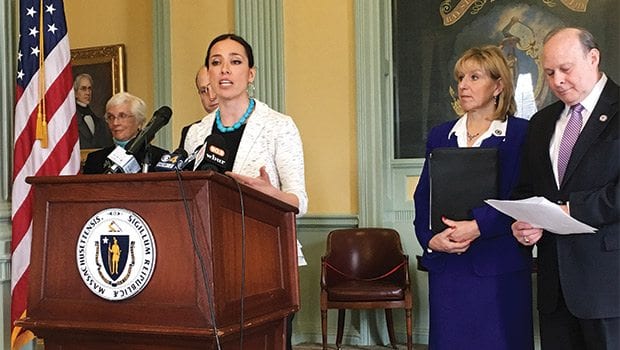Senate bill irks charter school supporters, foes
Coalition will move forward with ballot initiative

A group of state senators last week rolled out compromise legislation that would over the next ten years raise the cap on the percentage of district funding for charter schools from the current 18 percent to 23 percent.
The announcement comes as a campaign led by the New York-based Families for Excellent Schools is preparing to spend $18 million on a ballot referendum that would allow up to 12 new charter schools a year — lifting the current cap that limits charter schools to 18 percent of school spending in the state’s low-performing districts.
“For us to allow this to go to the ballot, which would expose the citizens of the commonwealth to $300 million a year in costs, is reckless,” said Barnstable Senator Dan Wolf, speaking during a State House press conference announcing the compromise legislation.
The legislation calls on the state to increase funding for charter and district-run schools with an increase of $1.4 billion to the state’s foundation budget for education over the next seven years, while lifting the cap by half a percent per year over the next ten years.
Additionally, the legislation would create a unified enrollment system, allowing parents to sign up for district and charter schools in the same process, while allowing parents who do not want their children to attend charter schools to opt out.
State Sen. Sonia Chang Diaz told reporters she represents parents with children in both charter and district schools and sought to craft legislation that would benefit both.
“I’m very pleased to say that this legislation meets that standard,” she said.
While senators spent months ironing out the details of the compromise bill, charter supporters and opponents rejected the legislation within hours of the senators’ Thursday press conference.
“This is not a reform bill,” said Marc Kenen, executive director of the Massachusetts Charter School Association, in a statement sent to the media. “It is designed to freeze the growth of public charter schools across the state, and it imposes onerous new regulations that will shackle the operation of existing charter schools.”
Charter school opponents were no more supportive of the senators’ legislation.
“The Senate legislation attempts to fix some of the significant flaws in our charter school system, and in doing so it exposes the serious problems charter schools present,” read a statement from Save Our Public Schools, a campaign funded by the state’s largest teacher unions that is aimed at defeating the pro-charter ballot measure. “The bill would perpetuate the very serious problem inherent in lifting the cap yet again: the expansion of a separate and unequal system. Commonwealth charter schools are causing grave harm to the real public schools in Massachusetts, taking hundreds of millions of dollars from our students and communities and putting these vital funds under the control of private entities. Given this reality the state should not move to expand their reach.”
Among the regulations Kenen referred to are the following measures:
n Requirements for charters to provide greater transparency and make public information on their finances, board meeting minutes and to disclose information on their contracts.
- A measure requiring charters to fill vacant seats when students leave mid-year.
- A requirement that charter school teachers undergo certification.
- A requirement that charter school teachers who opt to form collective bargaining units be afforded wages and benefits commensurate with those available to teachers in the districts in which the charters operate.
Additionally, schools that suspend high numbers of students or maintain higher-than-average attrition rates would have their charters revoked.
The measures appear designed to bring a higher degree of accountability to the state’s charter schools, which critics say push out English Language Learners, low-performing students and students with learning disabilities through suspension rates that are often many times higher than those of district schools.
The Senate legislation would also hand charter schools a significant victory, with language that would enable urban school districts to incorporate charters into unified districts in which students could be assigned to charters through the district school enrollment process. The legislation would extend the maximum time school districts could rent or lease school buildings to charter schools from the current 10 years to 30 years.
Senators at last week’s press conference said they sought to level the playing field between charter and district-run schools.
“The Senate took this bill as an opportunity to address funding and fairness for all of our students,” said Ashland Senator Karen Spilka. “We are in a unique moment. We can take all we have learned over 20 years of education reform and adequately, fairly and fully fund our education system.”
The Senate is expected to debate and vote on the legislation this week.







